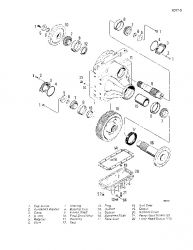Case 1150E, 1155E Crawler Workshop Repair & Service Manual
Catalog:
Model:
Complete digital workshop manual contains service, maintenance, and troubleshooting information for the Case 1150E, 1155E Crawler. Diagnostic and repair procedures are covered in great detail to repair, maintain, rebuild, refurbish or restore your Case 1150E, 1155E Crawler like a professional mechanic in local service/repair workshop. This cost-effective quality manual is 100% complete and intact as should be without any missing pages. It is the same factory shop manual used by dealers that guaranteed to be fully functional to save your precious time.
This manual for Case 1150E, 1155E Crawler is divided into different sections. Each section covers a specific component or system and, in addition to the standard service procedures, includes disassembling, inspecting, and assembling instructions. A table of contents is placed at the beginning of each section. Pages are easily found by category, and each page is expandable for great detail. It is in the cross-platform PDF document format so that it works like a charm on all kinds of devices. You do not need to be skilled with a computer to use the manual.
"Service Manual.pdf"
Case 1150E, 1155E Crawler Service Manual
1,503 pages
"9-9942.pdf"
Case 1150E, 1155E Crawler Operator's Manual
158 pages
EXCERPT:
CAUSES OF PREMATURE TURBOCHARGER FAILURE
Certain operating and maintenance conditions can arise which could cause premature turbocharger failure. NOTE: The total solution to the problem is not in repairing the failure, but in determining the cause. Replacing a damaged turbocharger without determining the cause will frequently result in a repeat failure.
Lack of Lubricating Oil
This type of failure can occur when the amount of oil being supplied to the turbocharger is insufficient to lubricate or cool bearing and journal surfaces.
Operating temperatures affect the volume of oil required by the turbocharger. As turbocharger speed or engine load increases, the need for lubricating oil increases. NOTE: Insufficient oil for periods as short as five seconds can cause failure. This is why it is necessary to prime the turbocharger as part of the everyday operating procedure. IMPORTANT:
It is very important that adequate lubrication reaches the turbocharger bearings and throughout the engine before operating the engine at rated speed.
Priming The Turbocharger
1. Place the transmission range shift lever in "N" Neutral position.
2. Set the throttle lever not more than 1/3 open position (1000 RPM).
3. Push in the fuel shutoff control. Press starter button until engine starts. IMPORTANT: Do not increase throttle or apply load until normal oil pressure shows on the engine oil pressure gauge, assuring proper lubrication to the turbocharger.
IMPORTANT: In very cold weather, at oil filter change or when the tractor has been idle for several weeks or more, proceed as follows to prime the turbocharger.
Pull out the fuel shutoff control, press the start button and hold. Allow the engine to crank until the engine oil pressure gauge pointer reaches the green zone. Do not exceed 30 seconds cranking time.
Push in the fuel shutoff control and press the start button. Run the engine (about 2 min.
max.) at 1000 RPM until normal engine oil pressure shows on the engine oil pressure gauge assuring proper lubrication to the turbocharger.
4. If the engine fires and stops, wait for the starting motor to stop spinning before attempting another start.
5. Do not use the starting motor longer than 30 seconds without interruption. Wait at least 3 minutes between crankings so batteries can recuperate and the starting motor can cool.
6. Should the engine kill when operating under load, immediately restart the engine to prevent over-heating caused by stopping the flow of oil for turbocharger, cooling and lubrication.
Foreign Material or Dirt in the Lubricating System.
Operating the engine with contaminated oil will cause damage to the turbocharger bearings if the particles are of sufficient quantity.
If the particles are large enough, they can clog the internal oil passages and starve the bearings. This is another reason why it is important to change the engine crankcase oil and oil filters at regular specified intervals.
Foreign Material in Exhaust or Air Intake Systems.
The rotating parts of the turbocharger can be damaged by particles introduced through the air intake, which makes proper maintenance of the air cleaner system very important.
High Exhaust Temperature
Excessive temperature in the exhaust system will cause lubricating oil to coke in the center housing drain annulus at the turbine end. Oil leakage, carbon deposits and eventual damage to the back of the turbine wheel will result.
High exhaust temperature can also erode the turbine housing creating pitting and deposits on the turbine wheel.
High exhaust temperature can be caused by the turbocharger itself. Carbon build up on the turbine wheel, if severe, will slow the rotating assembly, reducing the amount of inlet air.
...





